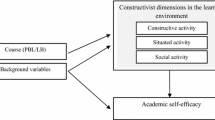Abstract
This paper presents a model for the type of classroom environment believed to facilitate scientific conceptual change. A survey based on this model contains items about students' motivational beliefs, their study approach and their perceptions of their teacher's actions and learning goal orientation. Results obtained from factor analyses, correlations and analyses of variance, based on responses from 113 students, suggest that an empowering interpersonal teacher-student relationship is related to a deep approach to learning, a positive attitude to science, and positive self-efficacy beliefs, and may be increased by a constructivist approach to teaching.
Similar content being viewed by others

References
Ames, C., & Archer, J. (1988). Achievement goals in the classroom: Students' learning strategies and motivation processes.Journal of Educational Psychology, 80, 260–267.
Argyle, M. (1975). The syntaxes of bodily communication. In J. Benthall & T. Polhemus (Eds.),The body as a medium of expression. New York: Dutton.
Blumenfeld, P.C., Mergendoller, J.R., & Puro, P. (1992). Translating motivation into thoughtfulness. In H.H. Marshall (Ed.),Redefining student learning: Roots of educational change (pp. 207–238). Norwood, NJ: Ablex.
Collins, A., Brown, J., & Newman, S. (1989). Cognitive apprenticeship: Teaching the crafts of reading, writing and mathematics. In L. Resnick (Ed.),Knowing, learning and instruction: Essays in honour of Robert Glaser (pp. 453–493). Hillsdale, NJ: Erlbaum.
Combs, A.W. (1984). Beliefs about good and poor teachers. Audio recording of ARCD paper.
Cosgrove, M., & Osborne, R. (1985). Lesson frameworks for changing children's ideas. In R. Osborne & P. Freyberg (Eds.),Learning in science: the implications of children's science pp. 101–111. Auckland, NZ: Heinemann.
Enochs, L.G., & Riggs, I.M. (1990). Further development of an elementary science teaching efficacy belief instrument: A preservice elementary scale.School Science and Mathematics, 90, 694–706.
Fraser, B.J. (1990).Individualised classroom environment questionnaire: Handbook. Hawthorn, Australia: ACER.
Grolnick, W.S., & Ryan, R.M. (1987). Autonomy support in education: Creating the facilitating environment. In N. Hastings & J. Schwieso (Eds.),New directions in educational psychology: 2. Behaviour and motivation in the classroom, pp. 213–231. London: Falmer.
Meece, J.L., Blumenfeld, P.C., & Hoyle, R.H. (1988). Students' goal orientations and cognitive engagement in classroom activities.Journal of Educational Psychology, 80, 514–523.
Pintrich, P.R., Marx, R.W., & Boyle, R.A. (1993). Beyond cold conceptual change: The role of motivational beliefs and classroom contextual factors in the process of conceptual change.Review of Educational Research, 63, 167–199.
Posner, G.J., Strike, K.A., Hewson, P.W., & Gertzog, W.A. (1982). Accommodation of a scientific conception: Toward a theory of conceptual change.Science Education, 66, 211–227.
Roth, K.J., Rosen, C., Hasbach, C., Hazelwood, C., Peasley, K., Hoekwater, E., Ligatt, C., & Lindquist, B. (1992).The role of writing in creating a science learning community. (Elementary Subjects Center Series No. 56). East Lansing, MI: Michigan State University, the Centre for the Learning and Teaching of Elementary Subjects. (ERIC Reproduction Service No. ED 352 259)
Taylor, P.C.S., Fraser, B.J., & White, L. (1994, April). CLES: An instrument for monitoring the development of constructivist learning environments. Paper presented at the annual meeting of the American Educational Research Association, New Orleans.
Tobin, K. (1993, November). Applications of qualitative and quantitative data in interpretive research. Keynote address presented at the International Conference on Interpretive Research in Science Education, Taiwan.
Tobin, K. (1993). Metaphors and images in teaching. In B.J. Fraser (Ed.),Research implications for science and mathematics teachers. (Monograph No. 5 by the National Key Centre for School Science and Mathematics (Especially for Women), pp. 26–30. Perth: Curtin University of Technology.
Watters, J.J., Ginns, I.S., Neumann, P., & Schweitzer, R. (1994, July). Enhancing preservice teacher education students sense of science teaching self efficacy. Paper presented at the Australian Teacher Education Association Conference, Brisbane.
Watts, M., & Bentley, D. (1987). Constructivism in the classroom: enabling conceptual change by words and deeds.British Educational Research Journal, 13, 121–135.
White, R.T., & Gunstone, R.F. (1989). Metalearning and conceptual change.International Journal of Science Education, 11, 577–586.
Wittrock, M.C. (1990). Students' thought processes. In M.C. Wittrock (Ed.),Research in teaching and learning (Vol. 3, pp. 1–49). New York: Macmillan. Reprinted from M.C. Wittrock (Ed.),Handbook of research on teaching, 1986. London: Collier Macmillan.
Wubbels, T. (1993). Teacher-student relationships in science and mathematics classes. In B.J. Fraser (Ed.),Research implications for science and mathematics teachers. (Monograph No. 5 by the National Key Centre for School Science and Mathematics (Especially for Women), pp. 65–73. Perth: Curtin University of Technology.
Author information
Authors and Affiliations
Additional information
Specializations: secondary school science learning environments, writing in science, alternative frameworks, the language of science.
Rights and permissions
About this article
Cite this article
Hanrahan, M. Student beliefs and learning environments: Developing a survey of factors related to conceptual change. Research in Science Education 24, 156–165 (1994). https://doi.org/10.1007/BF02356340
Issue Date:
DOI: https://doi.org/10.1007/BF02356340



